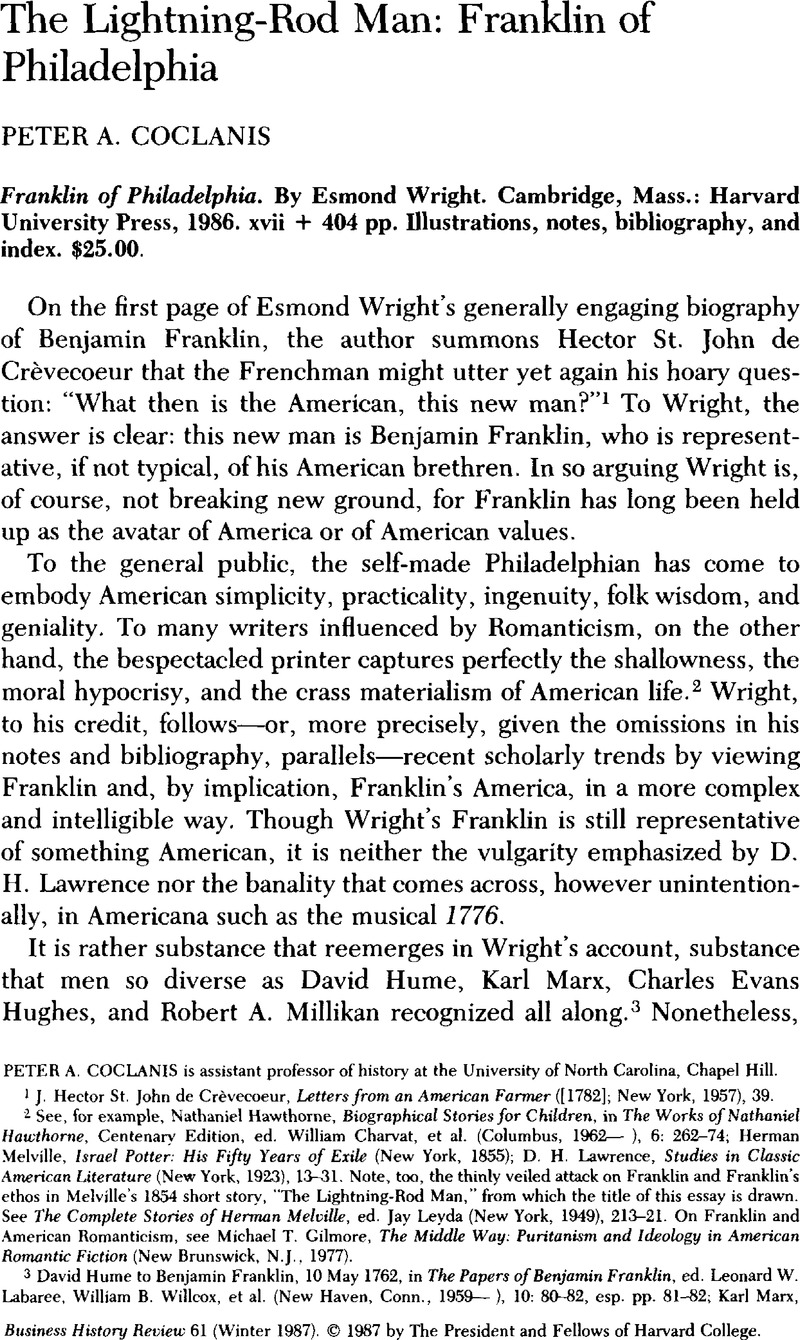No CrossRef data available.
Published online by Cambridge University Press: 11 June 2012

1 de Crèvecoeur, J. Hector St. John, Letters from an American Farmer ([1782]; New York, 1957), 39Google Scholar.
2 See, for example, Nathaniel Hawthorne, Biographical Stories for Children, in The Works of Nathaniel Hawthorne, Centenary Edition, ed. Charvat, William et al. , (Columbus, 1962—), 6: 262–74Google Scholar; Melville, Herman, Israel Potter: His Fifty Years of Exile (New York, 1855)Google Scholar; Lawrence, D. H., Studies in Classic American Literature (New York, 1923), 13–31Google Scholar. Note, too, the thinly veiled attack on Franklin and Franklin's ethos in Melville's 1854 short story, “The Lightning-Rod Man,” from which the title of this essay is drawn. See The Complete Stories of Herman Melville, ed. Leyda, Jay (New York, 1949), 213–21Google Scholar. On Franklin and American Romanticism, see Gilmore, Michael T., The Middle Way: Puritanism and Ideology in American Romantic Fiction (New Brunswick, N.J., 1977)Google Scholar.
3 David Hume to Benjamin Franklin, 10 May 1762, in The Papers of Benjamin Franklin, ed. Labaree, Leonard W., Willcox, William B. et al. , (New Haven, Conn., 1959—), 10: 80–82Google Scholar, esp. pp. 81–82; Marx, Karl, Value, Price and Profit, ed. Averling, Eleanor Marx (London, 1899), 45Google Scholar; Marx, , Capital, ed. Engels, Frederick, trans. Samuel Moore and Edward Aveling ([1867–94]; New York, 1967), 1: 51nlGoogle Scholar; Hughes, Charles E., “‘The Greatest Diplomat of All Time,’“ in The Amazing Benjamin Franklin, ed. Smythe, J. Henry Jr, (New York, 1929), 1Google Scholar; Millikan, Robert A., “Benjamin Franklin as a Scientist,” Journal of the Franklin Institute 232 (Nov. 1941): 407–23CrossRefGoogle Scholar.
4 See Marx, Value, Price and Profit, 45; Marx, Capital, 1: 51n1; Schumpeter, Joseph A., History of Economic Analysis, ed. Schumpeter, Elizabeth Boody (New York, 1954), 199Google Scholar. Franklin's 1728 essay can be found in Labaree, Willcox, et al., The Papers of Benjamin Franklin, 1: 139–57. Note that Franklin's essay appeared originally in the 17 December 1728 issue of the Maryland Gazette, it was published in pamphlet form in Philadelphia several months later. Not surprisingly, Franklin articulated his position on value elsewhere as well. See, for example, Benjamin Franklin to Lord Kames, 21 Feb. 1769, in Labaree, Willcox, et al.. The Papers of Benjamin Franklin, 16: 46–48, esp. p. 47.
5 See, for example, Weber, Max, The Protestant Ethic and the Spirit of Capitalism, trans. Parsons, Talcott ([1904–1905]; New York, 1958), esp. pp. 47–78Google Scholar; Miller, Perry, “Benjamin Franklin—Jonathan Edwards,” in Major Writers of America, ed. Miller, et al. , (New York, 1962), 1: 83–98Google Scholar.
6 Fiering, Norman S., “Benjamin Franklin and the Way to Virtue”, American Quarterly 30 (Summer 1978): 199–223CrossRefGoogle Scholar.
7 The phrase quoted in the text is from Terry Eagleton. See Eagleton, , Literary Theory: An Introduction (Minneapolis, Minn., 1983), 131Google Scholar.
8 See Wright, Esmond, Benjamin Franklin and American Independence (London, 1966)Google Scholar; Wright, “Introduction,” to Benjamin Franklin: A Profile, ed. Wright, Esmond (New York, 1970), vii–xxivGoogle Scholar.
9 See, for example, Van Doren, Carl, Benjamin Franklin (New York, 1938)Google Scholar; Lemay, J. A. Leo, “Benjamin Franklin, Universal Genius,” in The Renaissance Man in the Eighteenth Century (Los Angeles, Calif., 1978), 1–44Google Scholar.
10 To argue for the centrality of liberal ideology in American history is not to deny the existence, much less the importance, of other ideological traditions, most notably that of republicanism. To my mind, however, liberalism, conjoined with capitalism, mattered most. For a recent discussion of the complex and convoluted nature of early American ideology, see Kloppenberg, James T., “The Virtues of Liberalism: Christianity, Republicanism, and Ethics in Early American Discourse”, Journal of American History 74 (June 1987): 9–33CrossRefGoogle Scholar.
11 McCoy, Drew R., “Benjamin Franklin's Vision of a Republican Political Economy for America”, William and Mary Quarterly 3d ser., 35 (Oct. 1978): 605–28CrossRefGoogle Scholar.
12 Lawrence, Studies in Classic American Literature, 14.
13 See Wright, Franklin of Philadelphia, 289.
14 Note that Tench Coxe was expressing much the same idea when he wrote that property “may almost be called the palladium of communities.” See Coxe, , Reflexions on the State of the Union (Philadelphia, 1792), 30Google Scholar.
15 See Foner, Eric, Tom Paine and Revolutionary America (New York, 1976), 35–36Google Scholar.
16 Hawthorne, Biographical Stories for Children, in The Works of Nathaniel Hawthorne, 6: 274.
17 There is, in fact, little danger that the Franklin industry will suffer through the process of deindustrialization any time soon, for new studies continue to pour out of both academic and nonacademic sweatshops. See, for example, Clark, Ronald W., Benjamin Franklin: A Biography (New York, 1983)Google Scholar; Randall, Willard Sterne, A Little Revenge: Benjamin Franklin and His Son (Boston, 1984)Google Scholar. One should also note that a new edition of Van Doren's 1938 biography appeared in 1987.